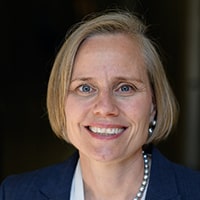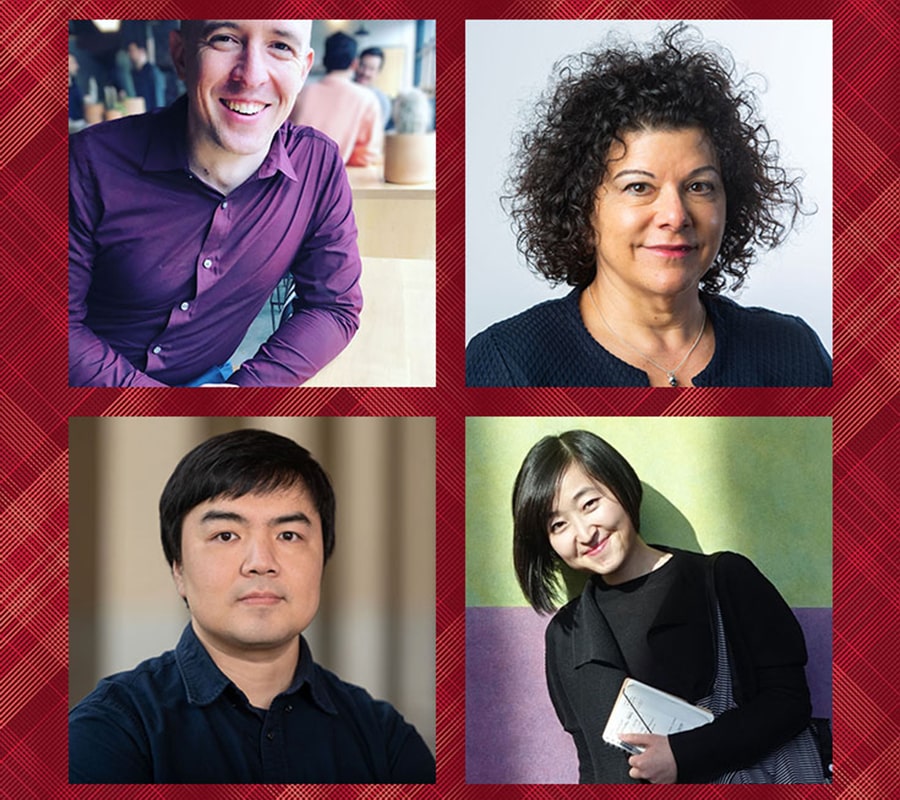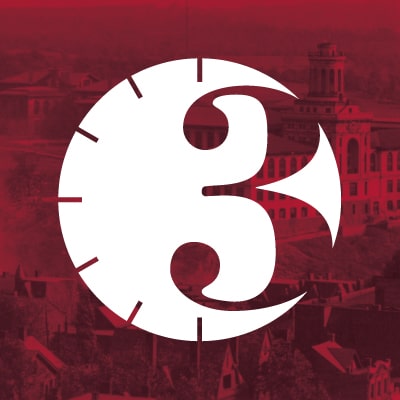News Briefs
Why Popular Baby Names Come and Go
Popular baby names, just like fashion styles and other pop culture trends, keep on changing. Researchers at Carnegie Mellon developed a mathematical model to understand why these behavioral patterns are constantly shifting, and it points to a tug-of-war between the need to stand out in the crowd and the need to fit in with the pack. The motives to conform and to be unique interact to produce complex dynamics when people observe each other in a social network.
“I wanted to use math to describe two conflicting motives — wanting to fit in and wanting to stand out at the same time,” said Russell Golman, associate professor in the Social and Decision Sciences Department. “They push you in opposite directions but you can want both things.”
Mathematically speaking, the desire to fit in would drive behavior toward the mean, or average, in the group while the desire to stand out would drive behavior away from the mode, or most common occurrence, in the group.
“Put them together,” Golman said, “and they still lead to equilibrium.” To break out of the equilibrium conundrum, Golman and his team added social networks to the mix, which included communities, neighbors, colleagues, clubs, or other social groups — not necessarily social media.
To test their new model, CMU Ph.D. student Erin Bugbee turned to the large database of baby names managed by the Social Security Administration for the last century. If baby names settled into an equilibrium, the most popular name would always be the most popular. But, that is not what happened.
As the popularity of one name, say Emily, peaks, parents may decide to forgo that name and pick a similar one, like Emma. By following this strategy, they are instilling in their new daughter a name that is socially acceptable by its similarity to the popular name but will allow her to stand out in the crowd by putting a unique twist on her identity. Many parents may be thinking the same thing and the number of little girls named Emily will decline while those named Emma will increase.
The study concludes that understanding social psychology and social network structure are both critical to explain the emergence of complex, unpredictable cultural trends.
Find out more about the study.
Megastudy Identifies Dozens of Ways to Boost Exercise

While numerous studies have tried to identify the silver bullet to get people to make long-lasting change in their exercise routines, most interventions have had little success. But a group of researchers from multiple institutions, including five from Carnegie Mellon, have taken a different approach to this problem. Through the University of Pennsylvania’s Behavior Change for Good Initiative, they decided to forgo a single, stand-alone study and opted for one massive project that includes thousands of participants.
This megastudy was set at one field site, 24 Hour Fitness, and recruited 61,293 participants from the organization’s membership. The participants were randomly put into different treatments, or arms, of the study. The value of the megastudy is that it is easier to compare results from one treatment to the next.
“Science has done this work piecemeal in the past, and you can’t compare across studies because so many things are different,” said Professor Gretchen Chapman, head of the Social and Decision Sciences Department at CMU. “For a megastudy, every participant is recruited in the same way so you can compare apples to apples to check for behavioral change.”
Participants were placed into one of 54 treatment arms for the 28-day study. One arm was the control in which members were thanked for their participation but did not receive any tips and simply earned a small lump sum payment for participation. All participants in the other arms received science-based tools to improve their exercise performance, but the details differed from arm to arm, such as reminders and/or incentives (ranging from $0.11 to $1.79 toward an Amazon gift card) for visiting the gym or performing other behaviors (e.g., responding to text messages or changing their workout schedules).
The treatment arm that showed the greatest success was the one that offered participants roughly a dime if they returned to the gym for a planned workout following a missed visit they had scheduled at the start of the study. This dime was in addition to the standard incentive of roughly a quarter paid for each workout. Future research could focus on this arm of the study to find out what exactly was the most effective part in getting people to return to the gym.
Biologists Awarded Grants from Pittsburgh's Kaufman Foundation
 Three Department of Biological Sciences faculty members have received grants from The Charles E. Kaufman Foundation, part of The Pittsburgh Foundation, to support their scientific research.
Three Department of Biological Sciences faculty members have received grants from The Charles E. Kaufman Foundation, part of The Pittsburgh Foundation, to support their scientific research.
 Assistant Professor of Biological Sciences Zheng Kuang received a $150,000 New Investigator grant to explore the mechanics of why metabolism is different in males and females. Using a mouse model, his research team will study how gut microbiotaregulates sex-specific rhythms in the intestine and how that affects nutrient absorption and energy stores.
Assistant Professor of Biological Sciences Zheng Kuang received a $150,000 New Investigator grant to explore the mechanics of why metabolism is different in males and females. Using a mouse model, his research team will study how gut microbiotaregulates sex-specific rhythms in the intestine and how that affects nutrient absorption and energy stores.
 Eberly Family Associate Professor of Biological Sciences Yongxin (Leon) Zhao and Maxwell H. and Gloria C. Connan Professor of Biological Sciences Alison Barth received a $300,000 New Initiative Grant to better understand how inhibitory neurons in the mammalian brain reconfigure within the brain’s cortical circuitry to facilitate learning.
Eberly Family Associate Professor of Biological Sciences Yongxin (Leon) Zhao and Maxwell H. and Gloria C. Connan Professor of Biological Sciences Alison Barth received a $300,000 New Initiative Grant to better understand how inhibitory neurons in the mammalian brain reconfigure within the brain’s cortical circuitry to facilitate learning.
Computer Science Faculty Receive Endowed Professorships
 Clockwise from top left: Keenan Crane, Jodi Forlizzi, Lining Yao and Jian Ma.
Clockwise from top left: Keenan Crane, Jodi Forlizzi, Lining Yao and Jian Ma.
Keenan Crane received the inaugural Michael B. Donohue Career Development Chair. Crane's work focuses on algorithms for processing and analyzing three-dimensional geometric data. Crane's professorship was created through a gift from Michael Donohue, who graduated from Carnegie Mellon in 2001 and was an early employee at WhatsApp. Donohue recently co-founded HalloApp, a new private social media network that allows users to connect with family and friends free from the bots, trolls, algorithms and other unpleasant aspects common in most apps.
Jodi Forlizzi was named the Herbert A. Simon Professor of Computer Science. Forlizzi is the associate dean of diversity, equity and inclusion for SCS and the outgoing director of the Human-Computer Interaction Institute. She works on using artificial intelligence as a design material and studies how AI will affect the future of work and how humans interact with AI. The Herbert A. Simon Professor of Computer Science chair was created in 1992 in memory of Simon, a University Professor and Nobel Laureate who helped found the field of AI and establish CMU as one of the world's foremost computer science institutions.
Lining Yao received the Cooper-Siegel Junior Chair. Yao directs the Morphing Matter Lab, which develops processes, materials, tools and applications for adaptive, dynamic and intelligent morphing matter. The Cooper-Siegel Junior Chair was endowed in 2012 by Eric Cooper, a university emeritus trustee and former CMU computer science professor who founded FORE Systems Inc., and his wife, community volunteer Naomi Weisberg Siegel.
Jian Ma was named the Ray and Stephanie Lane Professor of Computational Biology. Ma's research focuses on developing machine learning algorithms to reveal the structure and function of the human genome and cellular organization, and their implications for human diseases. The Lane Professorship in Computational Biology was established in 2007 by Raymond J. Lane and his wife, Stephanie H. Lane, to support a senior faculty member in any area of the university who specializes in computational biology. Ray Lane is a Pittsburgh native and former chair of CMU's board of trustees. A generous donation from the Lanes enabled the creation of the Lane Center for Computational Biology, the forerunner to the Computational Biology Department in SCS.
Attention Faculty: Apply for the Innovative Models for Undergraduate Research Fellows Program
Applications for the Innovation Models for Undergraduate Research (IMUR) Faculty Fellows Program are due by Monday, January 10. IMUR is designed to support CMU faculty who want to “think outside the box” about what undergraduate research or creative inquiry could look like in their discipline. Specifically, how can it scale beyond the 1:1 mentor:student model and better support underrepresented students through innovative approaches to recruitment and inclusive teaching?
Each IMUR Fellow will receive a $4,000 stipend to work with the Eberly Center and Undergraduate Research Office to implement, assess and document their new model of undergraduate research/creative inquiry, plus additional funding to implement their model as a 99-520 course in U22. Projects must support a minimum of 10 students. All disciplines are encouraged to apply. No prior experience with undergraduate research required.
Apply here by January 10! Learn about previous projects.
Attention Ph.D. Candidates: Seeking Participants for Three Minute Thesis Competition
 Think your Ph.D. students can discuss their thesis in plain language in under three minutes for a chance to win technology or research/travel grants?
Think your Ph.D. students can discuss their thesis in plain language in under three minutes for a chance to win technology or research/travel grants?
The Three Minute Thesis (3MT®) Competition challenges CMU doctoral candidates to present a compelling oration on their thesis and its significance in just three minutes, in language appropriate for a general audience. 3MT is not an exercise in trivializing or "dumbing-down" research, but requires students to consolidate their ideas and crystallize their research discoveries.
Any currently enrolled CMU Ph.D. student may sign up to compete. Register online. The registration deadline is February 14, 2022, 5 p.m. ET. Preliminary heats will be held February 21 – March 16, with the championship round being held the last week of March.
Heat winners will win their choice of either $1,000 toward research/travel needs or $1,000 credit to the University Computer store to be used at their discretion. Championship winners will receive $3,000, $2,000 and $1,000 in research/travel grants and a potential $500 research/travel grant for the “People’s Choice” and “Alumni’s Choice” award.
Questions? Contact Andy Prisbylla, student engagement coordinator, at andyp@andrew.cmu.edu.
Tartan Testing Has Moved to TCS Hall
The location for the university’s asymptomatic COVID-19 testing program, also known as Tartan Testing, has moved to the first floor of TCS Hall at 4665 Forbes Avenue. Tartan Testing hours are:
- Monday: 6 a.m. to 4 p.m.;
- Tuesday: 8 a.m. to 4 p.m.;
- Wednesday: 8 a.m. to 4 p.m.; and
- Thursday: 8 a.m. to 4 p.m.
Tartan Testing appointments for the following week become available every Friday. When looking for weekly appointments, log in through HealthConnect and manually adjust the date at the top of the screen to see availability for that day. Appointments are available a week at a time.
For more information, visit the COVID-19 Updates website. If you have difficulty scheduling for Tartan Testing, contact drbc@andrew.cmu.edu.
Who's New at CMU?
Carnegie Mellon welcomes the following new staff members this week.
- Conrad Kalcich, Assistant Director of Housing Operations, Community Life;
- Jordan Elling, Assistant Director of Admission, Remote Experiences, Undergraduate Admissions;
- Megan Walter, Senior Director, Talent Acquisition, HR Operations;
- Samantha Bridge, Administrative Coordinator, Electrical & Computer Engineering;
- Shannon Musgrave, Director of Marketing and Communications, School of Drama;
- Anne Chen, Educational Instructional Staff, Architecture;
- Jacob Dunston, Contracts Analyst, Associate Vice President for Research & Academic Admin;
- Nicholas Yee, CAPS Triage, Consultation & Case Clinician, Community Health & Well-Being;
- Priscilla Morales, Assistant Director of Admissions, Heinz College;
- Salima Clark, Accessibility Specialist, Disability Resources;
- Sean Mawhinney, Corporate Startup Lab Part-time Program Manager, Tepper Entrepreneurial Center;
- Liza Torrence, Temporary Employment Service, HR Operations; and
- Margo Littell, Temporary Employment Service, HR Operations.
